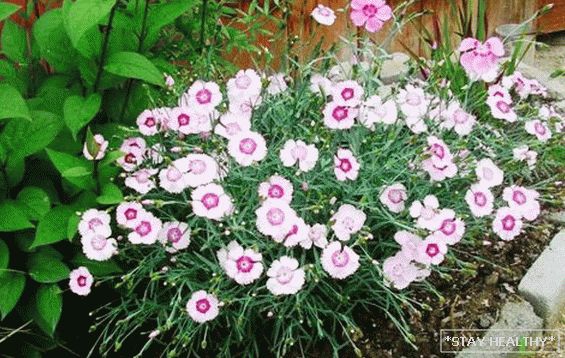 Пт, 12 авг 2016 Автор: Юлия Кривенко
Пт, 12 авг 2016 Автор: Юлия Кривенко
The garden carnation is a perennial herbaceous flower of the family.
clove.
The stems of the plant are knotty, the leaves of some species have
blue tint. Breeders bred over 300 varieties
garden гвоздики, которые притягивают взгляды своей красотой.
The rich color range of the plant includes all shades, for
except blue.
Hybrid plants have a two-tone color petals, strokes and
blotches of contrasting shades, simple and terry forms
inflorescences.
Contents
Varieties and types of perennial carnations (photo)
Any kind of carnation looks beautiful on a flower bed and does not require
specific care.
1. Гвоздика многолетняя перистая — махровая
a type of plant. Its dense low bushes play bright
paints, giving a flowerbed an unusual look. Flowering of this variety
lasts several months, which will allow throughout
summer enjoy the scent of cloves. A variety of colors and
compact form allows you to use the plant when creating
alpine slides.
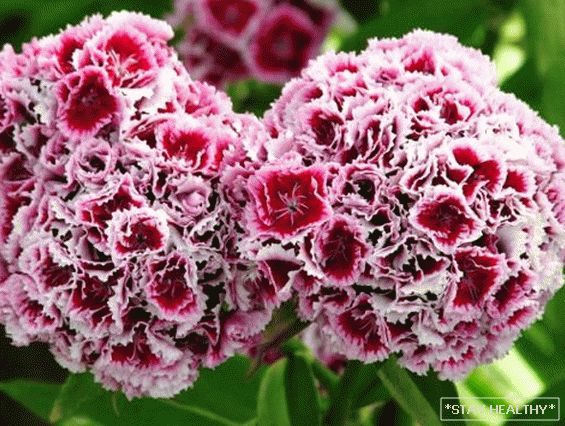
2. Perennial Dutch Carnation (garden)
distinguished by its continuous flowering, which begins in June and
lasts until the most frost. Obtained by crossing
different types of carnations. In the southern regions of the country flowering
lasts almost all year round.
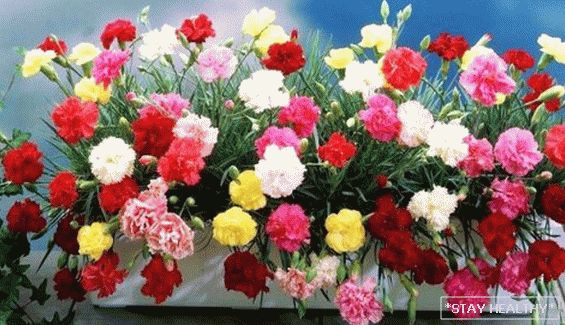
3. Многолетняя гвоздика Шабо — сорт с крупными
flowers of various shades. Terry inflorescences very
varied, petals are arranged in fancy buds that have
wavy or corrugated edges. The plant has a captivating
aroma.
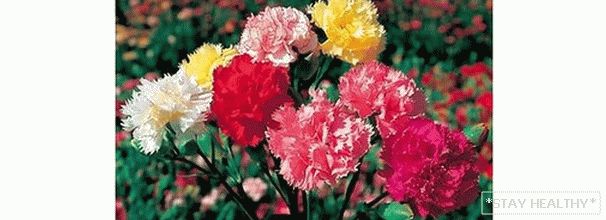
4. Турецкая гвоздика — разновидность
perennial carnations, pretty unpretentious variety. Large flowers
Combine several colors – this is the main difference
Turkish carnations from other species.
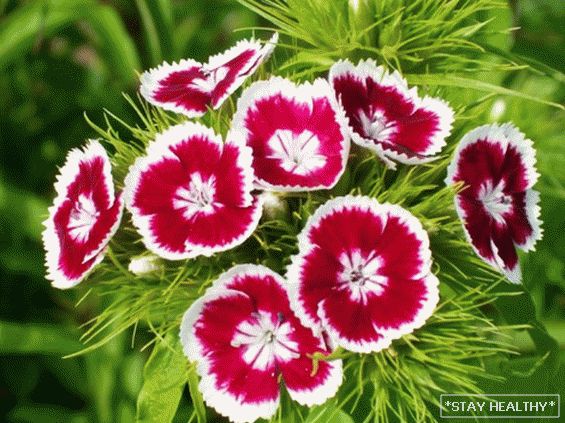
Planting carnations in the garden
Place for cloves to pick a sunny, well-lit.
Low cold areas with stagnant water are not suitable for growing
perennial carnations. The plant does not tolerate planting in shady and
wet places. It causes various diseases that result
to the death of the plant.
The soil for the plant requires neutral or sandy. For
adding peat or river sand to friable soil.
Some types of cloves give seeds from which you can
get good plants. For выращивания гвоздики
perennial in open ground they are sown in spring when the temperature
air reaches a constant mark of +15 degrees. Land for sowing
must be well prepared: they dig it up and fertilize it.
The embedment depth is 1 cm. Planting should be covered
foil before the first germination, which will be at a temperature
+ 18 degrees. When shoots appear, covering material is removed,
the plants are thinned as soon as two true
leaf.
Growing carnations can be perennial
in a way. For этого семена высевают в подготовленные
containers at the end of March. On cloudy days provide the necessary
the level of seedling illumination is possible with the help of fitolamps. Pick
seedlings are carried out in April, when the plants get stronger. Nip
Bush do in the presence of 5 leaves. Permanent seedlings
planted in late May, when the threat of frost has passed. Distance
between plants in the garden should be at least 30 cm.
Care for perennial carnations in the garden
Beautiful plant does not require special care, high costs
forces. All the plant needs is watering, weeding,
top dressing, cleaning.
Watering and weeding cloves
When growing cloves perennial need to be maintained
required level of soil moisture. You need to water the plant often
but little by little that will help avoid root rot.
Weeding cloves and loosening the soil combined with the removal
weeds that clog the plant and prevent it from developing. AT
only young plants need adult regular weeding
specimens are capable of restraining the growth of weeds, covering the soil
thick carpet.
Plant nutrition
Any ornamental plant needs feeding, and
perennial carnation is no exception. Throughout the period
Growth and development of the plant must be fertilized.
• The first feeding occurs in the spring when it starts
active growth shoots. AT этот период применяют азотсодержащие
fertilizer.
• ATторой раз проводить подкормку нужно в момент закладки
buds. Как правило, переходят на фосфорно-калийные fertilizer.
• The third time the carnation is fed after flowering.
Perennial clove responds well to mineral
complexes for flowering plants. With dosages of nitrogen fertilizers
one has to be very careful, since over-saturation leads to
various diseases.
ATажно! Apply manure as fertilizer
for perennial cloves is highly undesirable.
Sanitary cleaning of perennial cloves
After flowering, cloves need to cut dry heads, which
spoil the look of the plant. AT этот период побеги гвоздики нужно
shorten what will benefit the flower. For your care
carnation will give another bloom that comes closer to
of autumn.
Experienced gardeners harbor perennial carnation in cold weather
of the year, especially if a snowless winter is expected.
How to propagate perennial carnations on your own (photo)
Almost all varieties of cloves can be propagated
in several ways:
• cuttings;
• division of the bush;
• seeds.
Clove cutting
The optimal time for the procedure is to start
of the summer The stalk is cut from a healthy plant. The length of the cutting should
life not less than 10 cm. Prepared cuttings treated with drugs
accelerating the growth of the roots and placed in the nutrient soil. Landing
Cover with a film before the appearance of new leaves. Young cuttings
quickly take root and turn into good strong bushes.
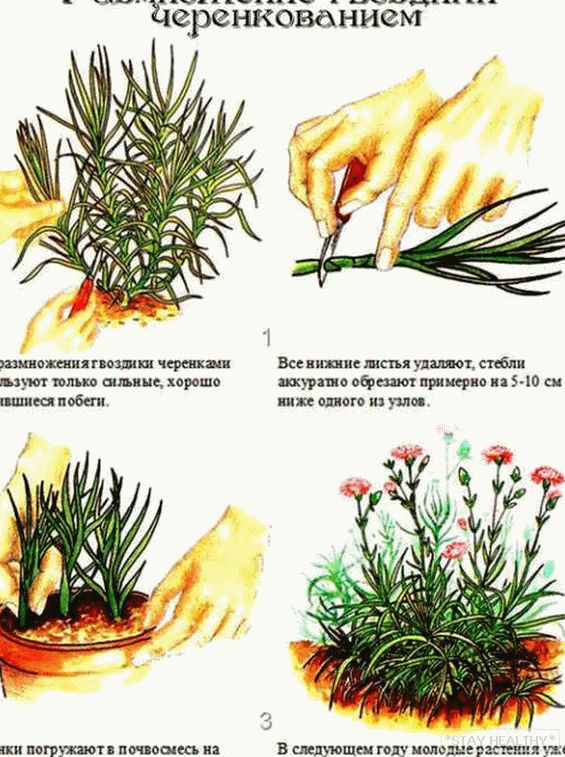
Dividing bush
Perennial carnation breeds well by dividing the bush. From
An adult plant can cut off the desired piece with its roots.
These bushes grow well in a new place and bloom already on
next year.
Seed propagation
With some varieties of cloves, you can collect your seeds, which
used for planting and growing seedlings. Gather dry
bolls in the fall, when the seeds are fully ripe.
ATажно! Hybrid varieties of cloves are not always
give a good result, so they are preferable to multiply
in other ways. With seed reproduction, the new plant does not
repeats all maternal qualities.
Difficulties in growing perennial carnations
Inexperienced gardeners often have to deal with some
сложностями при посадке perennial carnations. This is a defeat.
plants diseases and pests.
The most dangerous pests of cloves are: Medvedka,
nematode, thrips. To combat the invasion of parasites need with
chemical preparations.
Of the fungal diseases, clove is most often affected.
fusarium, rust and speckled. Prevention against
fungal disease is the right care.
Tip! ATысаживать многолетнюю гвоздику
need away from tulips. These plants are affected by the same
diseases, but they have different methods of struggle. Those drugs that
Tulips are well treated, can not be used for treatment
carnations.





